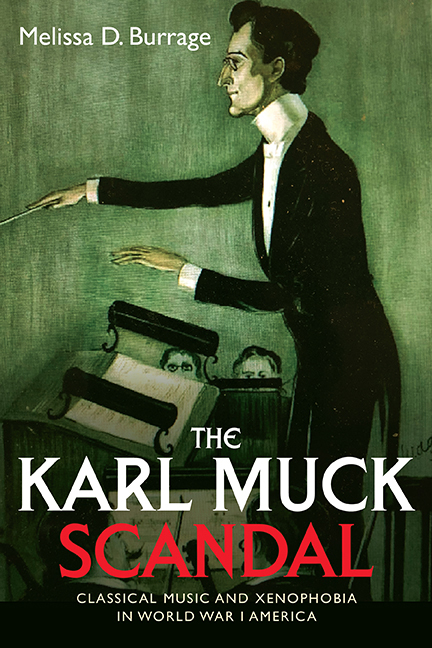Book contents
- Frontmatter
- Dedication
- Contents
- Introduction
- 1 Here on Foreign Shores: Dr. Karl Muck's Acclaim in Boston (1906–1918)
- 2 Mobilization: A Changing Environment for Boston (1917)
- 3 Selling the War: Demonizing the Enemy (1918)
- 4 “Looking for the Trump Card”: Mrs. William Jay's Attacks on Karl Muck in Wartime America (1915–1918)
- 5 “A Leaf in the Storm”: Muck, Higginson, and the Boston Symphony Orchestra (1918–1919)
- 6 Muck's Arrest: “Finding ‘One Weak Spot’” (1918–1919)
- 7 “Only Too Proud to Shoulder It All”: The Sexual Climate of Wartime Boston and Muck's Fall from Grace (1918–1919)
- 8 Muck's Final Years: His Association with the Wagners and Adolf Hitler (1920–1940)
- Coda (1919 to Present)
- Acknowledgments
- Notes
- Bibliography
- Index
- Eastman Studies in Music
Coda (1919 to Present)
Published online by Cambridge University Press: 06 September 2019
- Frontmatter
- Dedication
- Contents
- Introduction
- 1 Here on Foreign Shores: Dr. Karl Muck's Acclaim in Boston (1906–1918)
- 2 Mobilization: A Changing Environment for Boston (1917)
- 3 Selling the War: Demonizing the Enemy (1918)
- 4 “Looking for the Trump Card”: Mrs. William Jay's Attacks on Karl Muck in Wartime America (1915–1918)
- 5 “A Leaf in the Storm”: Muck, Higginson, and the Boston Symphony Orchestra (1918–1919)
- 6 Muck's Arrest: “Finding ‘One Weak Spot’” (1918–1919)
- 7 “Only Too Proud to Shoulder It All”: The Sexual Climate of Wartime Boston and Muck's Fall from Grace (1918–1919)
- 8 Muck's Final Years: His Association with the Wagners and Adolf Hitler (1920–1940)
- Coda (1919 to Present)
- Acknowledgments
- Notes
- Bibliography
- Index
- Eastman Studies in Music
Summary
Regardless of Karl Muck's complex personality and his anti-Semitic actions in Europe following World War I, he was, from our present- day point of view, severely mistreated in the United States during the Great War, and his professional reputation, which he had earned and worked so hard to achieve, was repeatedly and often dishonestly assaulted. His personal life became front-page news. Victimized by Lucie Jay and the New York capitalist class, by the American news media, and by the federal government, there was very little that he could do to fight this injustice. “Here in America there is no place for a German,” Muck told a reporter before his deportation. “I never had any idea that such discrimination could take place.” But he was not entirely defeated.
Before Muck was released from the Fort Oglethorpe Internment Camp, he committed an act of rebellion against the federal authorities there. Muck gave an interview to radical journalist and social critic H. L. Mencken, the most renowned political commentator of the era. Mencken was a German sympathizer who mocked the Americanization movement and viewed the world in racial and elitist terms. He recounted his postwar interview with Muck:
I had met Muck in America, and we sat down for a friendly chat. He had been interned after his dismissal and he told me that in the camp he was sent to, somewhere in Tennessee, he found more than a hundred other German musicians. Most of them had their instruments with them, and they soon formed an orchestra, with Muck as its leader. He said that they gave some of the best concerts he had ever conducted…. Once, on a very hot day, they played Beethoven's Eroica Symphony stark naked. “It was,” said Muck, “a really magnificent performance though the heat was hard on the violin strings. Beethoven would have been proud of it.”
While this nude performance appears to be an innocent act of climate control, it also represents a significant act of defiance. One can imagine the musicians seated with their instruments before them, somewhat concealing their genitalia from view. Muck, as the conductor, however, would have stood directly before the entire ensemble, arms outstretched and in full visual display.
- Type
- Chapter
- Information
- The Karl Muck ScandalClassical Music and Xenophobia in World War I America, pp. 308 - 316Publisher: Boydell & BrewerPrint publication year: 2019



